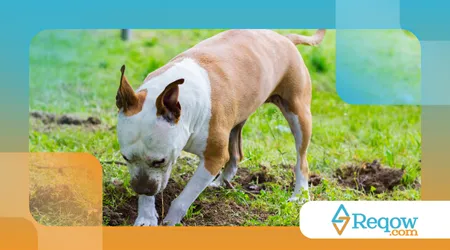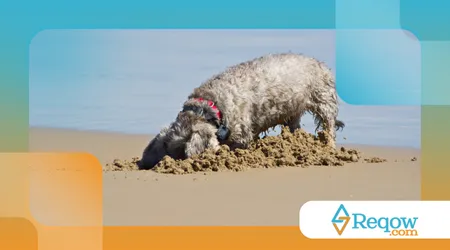Why do dogs bury objects?

Why do dogs bury objects?The enigmatic behavior of our four-legged friends, which involves hiding treats, toys, or even newly acquired bones, intrigues many owners.
Advertisements
This is an ancient ritual that manifests itself in modern gardens. This seemingly random action has deep roots in canine biology and evolutionary history.
Deciphering this mystery means delving into the mind of a domesticated predator.
Understanding this drive is crucial for well-being and harmonious coexistence. After all, who hasn't had a dog digging up the yard?
The Wild Origin: The Instinct for Survival
The practice of burying objects is not a whim, but rather an evolutionary legacy of wolves. Our domestic dogs carry this genetic code.
Advertisements
This behavior is a food resource storage strategy. In the wild, food is uncertain and scarce.
How Has Evolution Shaped Canine Burrowing Behavior?
Canine ancestors needed to secure their next meal. They buried excess game for later consumption, preserving it.
The soil acts as a natural refrigerator, keeping food fresh.
The scent of buried meat disguises itself, making it difficult for other predators to locate. It's a clever resource management tactic.
So, burying is a way to save food for hard times. The modern dog, though well-fed, still follows this primal impulse.
He can bury a tasty bone. He can hide a favorite toy. This demonstrates the power of genetic memory.
Behavior and Psychological Factors: What Does a Dog Feel When Burying?
The act of digging and hiding is linked to different emotional states and needs. It's not just about food or scarcity.
The dog seeks comfort, security, and possession. It's a manifestation of control over its environment.
What Does It Mean If a Dog Hids Non-Food Items?
When a dog buries a toy, it usually indicates that he values the item. He's guarding a personal treasure.
It's a way of protecting something important to them. Other times, the behavior is motivated by boredom. A bored dog channels its energy into digging.
Burial can, ironically, be a form of play. Anxiety and stress also trigger this action.
Read more: Interesting facts about dog breeds that almost disappeared
For example, a Golden Retriever can dunk your favorite ball.
He does this when he notices movement in the house. He feels he might lose the house to the other dog. It's a self-preservation move.
On the other hand, domestic dogs live in abundance, unlike their ancestors. They receive quality food at regular times.
However, the instinct to hoard doesn't disappear. It's just redirected.

What Do Experts Say About the Stockpiling Instinct?
According to renowned ethologist Dr. Alexandra Horowitz, in her book Inside of a Dog: What Dogs See, Smell, and Know, dogs have a sense of possession.
They use burial as a "safety pantry." The instinct persists, even when there's no real need.
Find out more: Interesting Facts About Dogs' Sense of Smell
An excess of a resource triggers guarding behavior. The dog hides what it considers valuable.
If an owner over-offers a special treat, the dog may bury it. The dog perceives the item as rare and needs to be kept. This is a natural response to perceived value.
On the other hand, some breeds have a greater genetic predisposition to digging.
The behavioral profile is notably distinct between groups. Hunting breeds and terriers are known for this ability.
How Do Breed Genetics Affect Burying Tendency?
THE Dachshund was bred to hunt badgers in underground burrows.
Digging is part of your nature. Beagle or a Terrier carry this strong genetic legacy. Breeds like the Pug or the French Bulldog exhibit this trait less.
The environment also plays a crucial role. A yard with loose soil is an invitation.
| Breed Group (AKC) | Race Example | Predisposition to Bury |
| Terrier | Jack Russell Terrier | High |
| Hunting Dog | Beagle | Moderate to High |
| Non-Sportsman | Poodle | Low to Moderate |
This genetic predisposition doesn't mean that all individuals will do it. However, the inclination is undeniable.
Similarly, why do dogs bury objects It's like asking why people keep money in the bank.
++ Tips to help your dog recover from surgery
Even if a person has savings for today, the act of saving provides future security. It's the preservation of resources.
Why do dogs bury objects? How to Deal with the Behavior?
Understanding behavior doesn't mean accepting it without limits. Proper environmental management is essential. Providing environmental enrichment is essential.
However, designated areas for digging must be provided. A "sandpit" solves the garden problem.
Avoiding over-feeding treats also helps. Reduce anxiety with exercise and play. Your dog needs to expend energy in a positive way.
Therefore, if an owner lives in an apartment, the dog has nowhere to dig. He might try to bury the bone in the sofa.
The owner should supervise the dog's snack intake and provide interactive toys to combat boredom.
Punishment is never the solution. Behavior replacement is the key.
Research shows that 681,000 dog owners in the United States report digging behaviors, with burying items being the most common. This demonstrates the frequency of the act.

A Gentle Look at Instinct
The act of burying reveals the rich tapestry of canine life. It is a manifestation of primal instincts and modern adaptations.
To understand why do dogs bury objects strengthens our bond. We must view this action with empathy and respect.
It's the wild heritage that resides in a domesticated being. It's not a mistake; it's just a dog being a dog. Why would we try to change their essence?
Frequently Asked Questions
Does the dog dig up the object because he forgot where he buried it?
It's not common. Dogs have remarkable spatial memory and a keen sense of smell. They usually know where the treasure is.
They may dig it up due to hunger or just to check the item.
Does burying objects indicate that the dog is hungry?
It may be an indicator in dogs that have been rescued from deprivation situations.
However, in most well-fed dogs, it's a protective or reserve instinct. It's not directly linked to immediate hunger.
What should I do if my dog buries valuable items in the yard?
First, restrict access to these items. Provide a permitted digging space, such as a litter box. Supervise and reward proper use. Never fight with your dog.
Do older dogs bury less than puppies?
The trend is not directly linked to age, but rather to energy and anxiety levels.
Some older, calmer dogs may bury less, but this is individual. The instinct remains.
Does the dog's breed influence the depth of burial?
Yes. Breeds with a burrowing instinct (like Terriers) tend to dig deeper holes. Larger breeds can dig wider, shallower holes.
